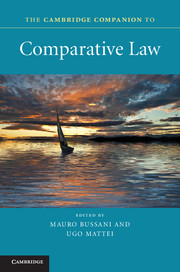Book contents
- Frontmatter
- Contents
- Contributors
- Abbreviations
- Preface
- Part I Knowing comparative law
- Part II Comparative law fields
- 6 Comparative studies in private law
- 7 Comparative administrative law
- 8 Comparative constitutional law
- 9 Comparative criminal justice
- 10 Comparative civil justice
- 11 Comparative law and international organizations
- Part III Comparative law in the flux of civilizations
- Index
- References
6 - Comparative studies in private law
Published online by Cambridge University Press: 05 May 2013
- Frontmatter
- Contents
- Contributors
- Abbreviations
- Preface
- Part I Knowing comparative law
- Part II Comparative law fields
- 6 Comparative studies in private law
- 7 Comparative administrative law
- 8 Comparative constitutional law
- 9 Comparative criminal justice
- 10 Comparative civil justice
- 11 Comparative law and international organizations
- Part III Comparative law in the flux of civilizations
- Index
- References
Summary
Until recently, comparative legal studies were devoted essentially to private law. While this European-born, nineteenth-century focus survived emigration, it often caused legal comparison to stay at the periphery of legitimate scholarship, particularly in the post-war twentieth-century United States. An opening outside traditional private law studies has now presented itself, and comparative law research with broader concerns has increasingly appeared and gained proper recognition. However, because of its displacement from centre stage, comparative private law as it was usually understood in academia is today in a state of crisis and in search of a new profile. Even in practice, the proper content and role of comparative private law have faced new challenges. In the light of these changes, a specific chapter on comparative private law in a book dealing with legal comparison appears to be quite justified.
Indeed, while economic globalization and neoliberal ideology have given private ordering unprecedented importance, there is at the same time a growing sense that private law cannot be meaningfully separated from its operational context. Comparatists increasingly agree that an inquiry within confines of ‘technical’ private law betrays a laissez-faire bias and ignores the social and public dimension of the questions addressed. Further, a growing number of scholars claim that comparative research must derive from an interdisciplinary and theoretical approach, and no longer consist only of describing and comparing the static and mechanical content of positive foreign rules and precedents. In this approach, comparison in private law tries to give meaning to the functioning of law in its given social context. With this more comprehensive and less doctrinal understanding, private law loses its mythical neutrality and reveals instead its cultural, economic, and political nature.
- Type
- Chapter
- Information
- The Cambridge Companion to Comparative Law , pp. 117 - 144Publisher: Cambridge University PressPrint publication year: 2012

